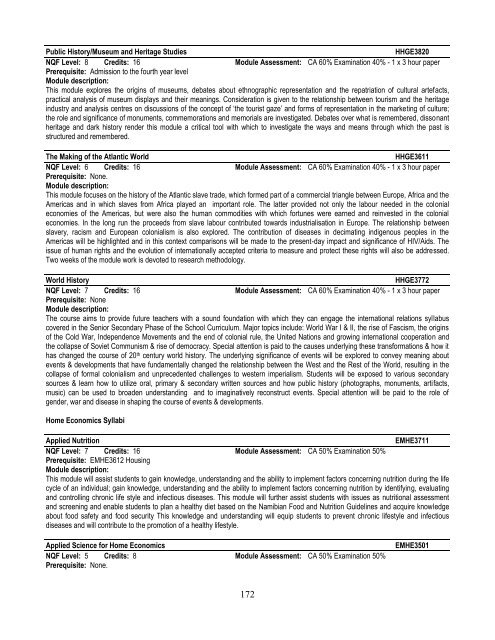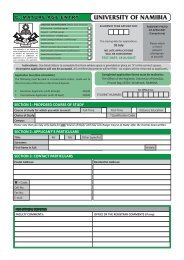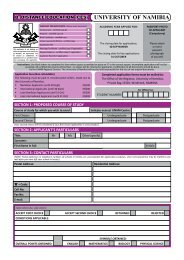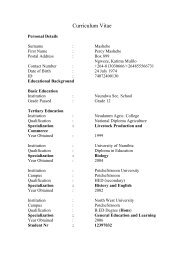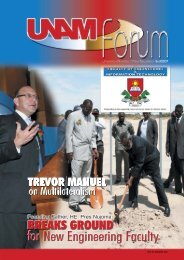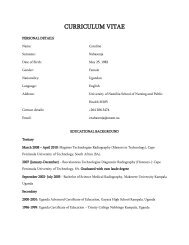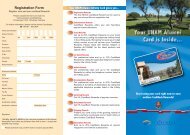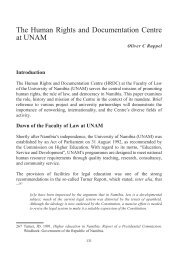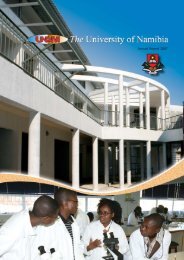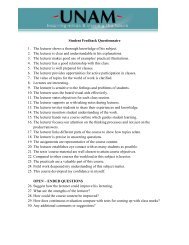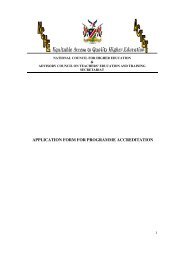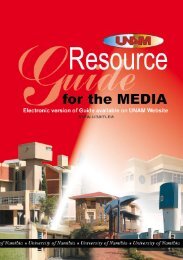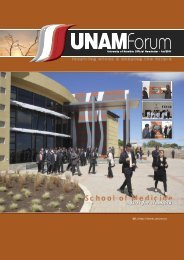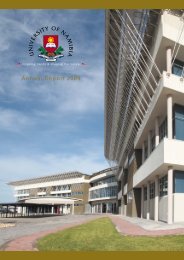UNIVERSITY OF NAMIBIA CENTRE FOR EXTERNAL STUDIES ...
UNIVERSITY OF NAMIBIA CENTRE FOR EXTERNAL STUDIES ...
UNIVERSITY OF NAMIBIA CENTRE FOR EXTERNAL STUDIES ...
Create successful ePaper yourself
Turn your PDF publications into a flip-book with our unique Google optimized e-Paper software.
Public History/Museum and Heritage StudiesHHGE3820NQF Level: 8 Credits: 16 Module Assessment: CA 60% Examination 40% - 1 x 3 hour paperPrerequisite: Admission to the fourth year levelModule description:This module explores the origins of museums, debates about ethnographic representation and the repatriation of cultural artefacts,practical analysis of museum displays and their meanings. Consideration is given to the relationship between tourism and the heritageindustry and analysis centres on discussions of the concept of ‘the tourist gaze’ and forms of representation in the marketing of culture;the role and significance of monuments, commemorations and memorials are investigated. Debates over what is remembered, dissonantheritage and dark history render this module a critical tool with which to investigate the ways and means through which the past isstructured and remembered.The Making of the Atlantic WorldHHGE3611NQF Level: 6 Credits: 16 Module Assessment: CA 60% Examination 40% - 1 x 3 hour paperPrerequisite: None.Module description:This module focuses on the history of the Atlantic slave trade, which formed part of a commercial triangle between Europe, Africa and theAmericas and in which slaves from Africa played an important role. The latter provided not only the labour needed in the colonialeconomies of the Americas, but were also the human commodities with which fortunes were earned and reinvested in the colonialeconomies. In the long run the proceeds from slave labour contributed towards industrialisation in Europe. The relationship betweenslavery, racism and European colonialism is also explored. The contribution of diseases in decimating indigenous peoples in theAmericas will be highlighted and in this context comparisons will be made to the present-day impact and significance of HIV/Aids. Theissue of human rights and the evolution of internationally accepted criteria to measure and protect these rights will also be addressed.Two weeks of the module work is devoted to research methodology.World HistoryHHGE3772NQF Level: 7 Credits: 16 Module Assessment: CA 60% Examination 40% - 1 x 3 hour paperPrerequisite: NoneModule description:The course aims to provide future teachers with a sound foundation with which they can engage the international relations syllabuscovered in the Senior Secondary Phase of the School Curriculum. Major topics include: World War I & II, the rise of Fascism, the originsof the Cold War, Independence Movements and the end of colonial rule, the United Nations and growing international cooperation andthe collapse of Soviet Communism & rise of democracy. Special attention is paid to the causes underlying these transformations & how ithas changed the course of 20 th century world history. The underlying significance of events will be explored to convey meaning aboutevents & developments that have fundamentally changed the relationship between the West and the Rest of the World, resulting in thecollapse of formal colonialism and unprecedented challenges to western imperialism. Students will be exposed to various secondarysources & learn how to utilize oral, primary & secondary written sources and how public history (photographs, monuments, artifacts,music) can be used to broaden understanding and to imaginatively reconstruct events. Special attention will be paid to the role ofgender, war and disease in shaping the course of events & developments.Home Economics SyllabiApplied NutritionEMHE3711NQF Level: 7 Credits: 16 Module Assessment: CA 50% Examination 50%Prerequisite: EMHE3612 HousingModule description:This module will assist students to gain knowledge, understanding and the ability to implement factors concerning nutrition during the lifecycle of an individual; gain knowledge, understanding and the ability to implement factors concerning nutrition by identifying, evaluatingand controlling chronic life style and infectious diseases. This module will further assist students with issues as nutritional assessmentand screening and enable students to plan a healthy diet based on the Namibian Food and Nutrition Guidelines and acquire knowledgeabout food safety and food security This knowledge and understanding will equip students to prevent chronic lifestyle and infectiousdiseases and will contribute to the promotion of a healthy lifestyle.Applied Science for Home EconomicsNQF Level: 5 Credits: 8 Module Assessment: CA 50% Examination 50%Prerequisite: None.EMHE3501172


